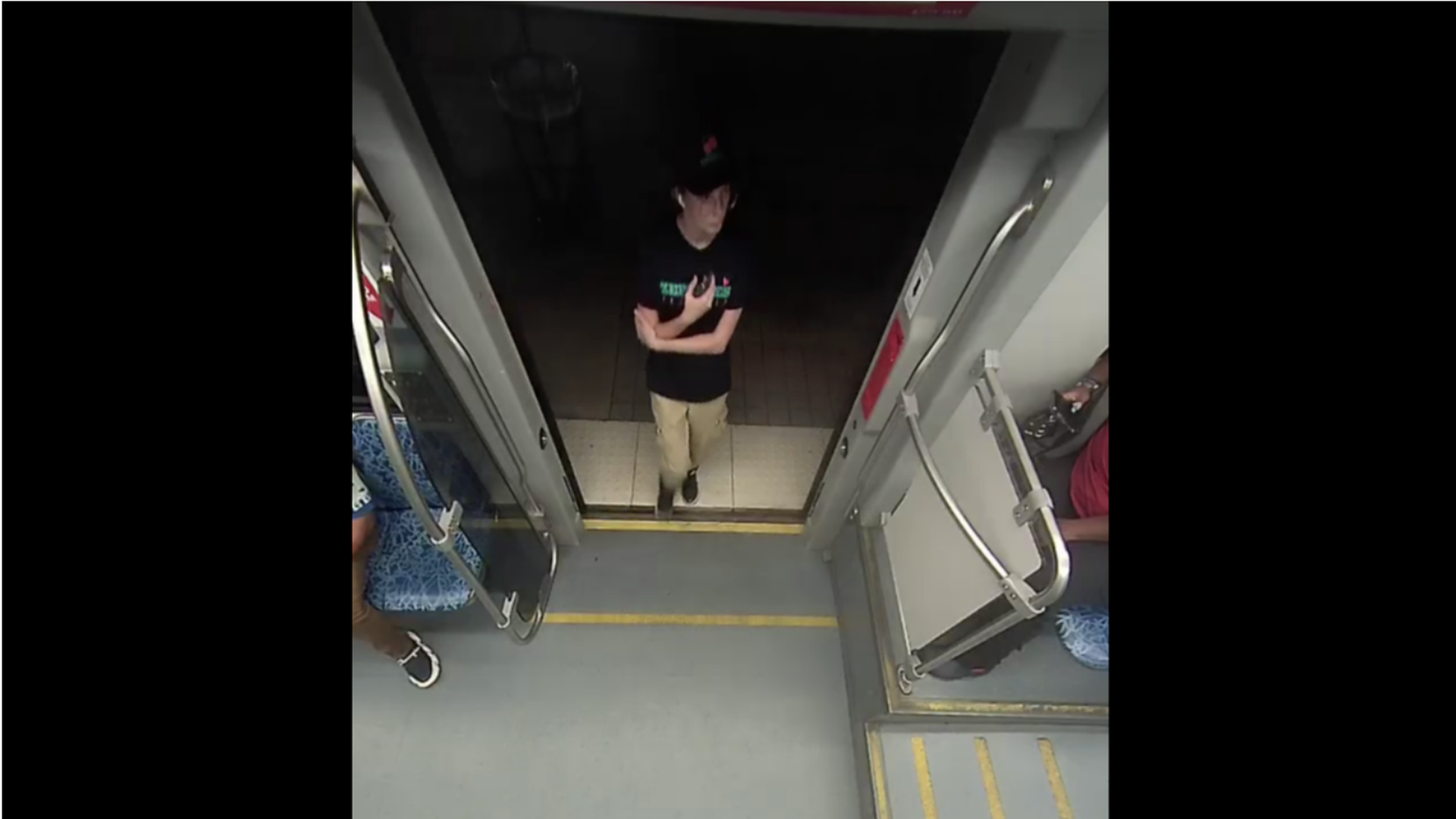Shocking Train Footage Reveals Final Moments of Ukrainian Refugee Iryna Zarutska: A Tragic End to the American Dream
In a chilling revelation that has gripped the nation and reignited fierce debates over public safety, newly analyzed surveillance footage from a Charlotte light rail train has captured the harrowing final seconds of Iryna Zarutska’s life. At precisely 8:41 p.m. on August 22, 2025, camera #12 aboard the Lynx Blue Line recorded the 23-year-old Ukrainian refugee standing nervously by the door, clutching her phone tightly to her chest as if it were a lifeline. Exactly 47 seconds later, the feed abruptly went dark—her phone signal vanishing from the network entirely, a digital echo of the violence that would claim her life moments before. This unprovoked stabbing, now dissected frame by frame, underscores the fragility of safety in America’s urban transit systems and the profound loss of a young woman who fled war only to meet a brutal end on a routine commute home.
Iryna Zarutska’s story is one of resilience turned to tragedy. Born on May 22, 2002, in Kyiv, Ukraine, she was an artist at heart, graduating from Synergy College with a degree in art and restoration. Her obituary paints a portrait of a vibrant soul: a sculptor who gifted handmade pieces to loved ones, a designer of eclectic clothing that mirrored her “radiant smile,” and an animal lover who walked neighbors’ pets with infectious enthusiasm. When Russia’s full-scale invasion shattered her homeland in 2022, Zarutska fled with her mother, sister, and brother to the United States, seeking the sanctuary her family had been denied. Her father, barred from leaving Ukraine under martial law, remained behind in a bomb shelter, a heartbreaking separation that would haunt their final days.
Arriving in North Carolina, Zarutska wasted no time rebuilding. She enrolled at Rowan-Cabarrus Community College, mastering English with remarkable speed and landing a job at Zepeddie’s Pizzeria in Charlotte’s South End. Dreams of becoming a veterinary assistant fueled her days; she even purchased a used car and scheduled her driving test for October, a milestone she shared proudly with her boyfriend during driving lessons he gave her. “She was proud of that,” her family’s lawyer later recounted, noting how she texted him that fateful evening: “I’ll be home soon.” Just ten minutes from her stop at Station 36, Zarutska embodied the immigrant grit that defines so many American success stories. Yet, on that humid August night, her journey ended in blood and silence.
The incident unfolded with merciless swiftness on the Charlotte Area Transit System (CATS) Blue Line. At 9:46 p.m.—a slight discrepancy from initial reports now clarified by timestamped logs—Zarutska boarded at the Scaleybark station, still in her pizzeria uniform, scrolling her phone for comfort amid the half-empty car. Seated directly behind her was Decarlos Brown Jr., a 34-year-old homeless man with a rap sheet spanning assaults, thefts, and mental health crises. Family members described him as paranoid, plagued by delusions; his sister would later claim to investigators that he believed Zarutska was “reading his mind,” a twisted justification for the horror to come.
For four agonizing minutes, the footage—obtained by CNN affiliate WCNC and corroborated by police affidavits—shows Brown fidgeting in his red hoodie, contorting his face in eerie grimaces while Zarutska remains oblivious, lost in her screen. Then, at 8:41 p.m., she rises, perhaps sensing unease, and positions herself by the door. Her phone, pressed close to her chest, captures what may have been a final, frantic message—its signal pinging the network one last time before the blade struck. Forty-seven seconds later, Brown lunges, unfolding a pocketknife and delivering three vicious stabs: two to her back, one severing her neck. Zarutska clutched at the wounds, blood pooling on the floor as she collapsed into her seat, her device slipping away into darkness.

The aftermath was chaos frozen in time. Extended surveillance, now circulating widely despite Mayor Vi Lyles’ pleas not to share it out of respect for the family, reveals a car of stunned passengers frozen in inaction. No one intervened as Zarutska gasped for air; it took several minutes for bystanders to alert the conductor or call 911. Released audio from those calls, obtained this week by TMZ and local outlets, captures the pandemonium: frantic voices shouting, “She’s bleeding out!” and “Someone get help!” as the train screeched to a halt at East/West Boulevard station. Brown, wounded in the scuffle by a passenger’s retaliation, fled but was apprehended blocks away, knife still in hand. Paramedics arrived too late; Zarutska was pronounced dead at the scene, her phone’s last signal a ghostly trace in the ether.
This footage, pieced together from multiple angles including the pivotal #12 camera, has become a viral indictment of urban decay. On X (formerly Twitter), users like @iamyesyouareno lamented, “It’s crazy how quickly all of this was swept under the rug… We did not forget about you, Iryna,” alongside a memorial image that garnered over 8,000 likes. Others, such as @MargoinWNC, decried slashed transit security budgets—down 40% in recent years—blaming “DEI babbling” for prioritizing optics over safety in a post that amassed hundreds of shares. The 911 tapes, dropped just days ago, amplify the outrage: callers describe a “woman covered in blood” while dispatchers scramble, echoing the bystander paralysis that allowed Brown, a repeat offender released on minimal bail despite prior violent episodes, to roam free.
Zarutska’s killing has transcended local news, exploding into a national flashpoint. President Donald Trump, fresh off his 2024 reelection, seized on it during a Charlotte rally last month, vowing to “crack down on crime in these Democrat-run hellholes” and linking it to “failed soft-on-crime policies.” North Carolina Governor Josh Stein called it a “stain on our state’s soul,” while Mayor Lyles, in a somber statement, urged restraint in sharing the video: “This heartbreaking attack took Iryna’s life—let’s honor her by fostering safety, not sensationalism.” Internationally, Ukrainian officials mourned a “daughter of Kyiv lost to American streets,” with President Volodymyr Zelenskyy tweeting condolences that trended globally.

Brown faces first-degree murder charges, held without bond pending a competency evaluation ordered last week. Court records paint a man adrift: homeless, untreated schizophrenia, and a history of arrests that critics say should have triggered intervention. His sister’s chilling affidavit—that he stabbed Zarutska because “she was in his head”—has fueled calls for mental health reforms intertwined with tougher sentencing. Yet, for Zarutska’s family, justice feels hollow. Her father, unable to attend the funeral due to travel restrictions, watched her service via video link from Ukraine. A GoFundMe for repatriation and memorials has raised over $150,000, with donors from Kyiv to Charlotte sharing stories of her kindness: the stray cats she fed, the art classes she volunteered to teach.
As candlelight vigils flicker across North Carolina—hundreds gathered in Huntersville last weekend, per X posts—the broader implications loom large. Transit crime nationwide spiked 20% in 2025, per preliminary FBI data, with light rail systems like Charlotte’s underfunded and under-patrolled. Advocates demand metal detectors, increased patrols, and AI-monitored cameras that could have flagged Brown’s erratic behavior. On Reddit’s r/UkrainianConflict, a thread titled “Horror video of Ukrainian refugee Iryna Zarutska’s slaughter” exploded with 1,800 upvotes, users decrying the “deafening silence” from bystanders and policymakers alike. “This should radicalize you,” echoed conservative influencer Braeden Sorbo on X, a sentiment rippling through threads mourning not just one life, but the eroded promise of refuge.
In the quiet aftermath, Zarutska’s Instagram—frozen on a June 9 selfie, her smile beaming—serves as a digital tombstone. She came to America for peace, texting loved ones of barbecues and beach days, only for her signal to fade in a pool of her own blood. The 47 seconds captured by camera #12 aren’t just evidence; they’re a siren call for change. As @moment_mirthful poignantly noted on X, “Iryna depended on public transportation… She was only ten minutes from home.” In a nation of dreamers, her story demands we make those dreams survivable.
For the Zarutskas, the war they escaped has claimed another casualty across the ocean. As investigations continue and Brown’s trial looms, one truth endures: Iryna Zarutska’s light, once so vibrant, was extinguished too soon. But in the outrage, the memorials, and the policy pushes it ignites, her memory endures—a fierce reminder that safety must be more than a signal on a screen.



